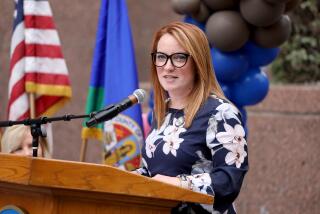Irvine Election Laws Create a Gap : City hall: The City Council could be without two members for three weeks and lacking a mayor for one week. An emergency session has been called.
IRVINE — The City Council will meet in an emergency session Saturday to attempt to rectify glitches in its election laws that could leave the council two members short for three weeks and the city without a mayor for one week.
City election laws passed in 1987 and 1988 have created a gap between the time outgoing council members are to leave office at the end of this month and when their successors are to be sworn in next month, a situation that Mayor-elect Sally Anne Sheridan described as “horrible.”
As a result, the council did not complete plans this week to certify the June 5 election results, and instead deferred the action to its emergency meeting, scheduled for 7:30 a.m. Saturday at City Hall.
A June 22 report by Stephen Coontz and Franklin Lunding, attorneys hired by the council to review the city’s election laws, said that the terms of outgoing Councilmen Cameron Cosgrove and Edward A. Dornan end Saturday. However, city election laws amended in 1988 call for the new council to be installed on July 20 each year, creating a three-week gap, the report said.
In this case, a council meeting scheduled for July 10 could not be attended by either of the two lame-duck council members or their successors, Art Bloomer and Barry Hammond.
In addition, Mayor Larry Agran’s term ends July 12, while Sheridan is not scheduled to take office until July 20, creating another gap, the report said.
Coontz said the problems “are likely to cause continuing confusion and controversy” if they are not remedied before the terms of Cosgrove and Dornan expire on Saturday.
Another area of confusion mentioned in the attorneys’ report is created by Measure D, which was passed in June, 1988. The law allows the public to petition for a special election to fill a council seat that is vacated when a council member wins the mayor’s race.
This year, Sheridan vacated a council seat with two years of a four-year term remaining. Before the passage of Measure D, that vacancy would have been filled by the third-highest vote-getter in the council race. In the June election, it was Mary Ann Gaido.
Under Measure D, if 7% of the city’s registered voters petition for a special election by July 15, they can try to elect a different candidate in November. A petition drive is under way, although Sheridan said she opposes it and wants to see Gaido seated.
The attorneys’ report questions whether Measure D is valid. It also questions how the petition should be worded and the procedure for the city clerk to certify signatures.
Sheridan, who campaigned heavily on a platform of election reform, vowed to repeal both the ordinance that allows direct election of mayor and Measure D.
“I think it’s horrible,” Sheridan said of the complications. “My intent is to get rid of this mess and form some sort of new election charter to get on the November ballot. This whole process is very cumbersome.”
The deadline for the council to place initiatives on the fall ballot is Aug. 10.
More to Read
Sign up for Essential California
The most important California stories and recommendations in your inbox every morning.
You may occasionally receive promotional content from the Los Angeles Times.










